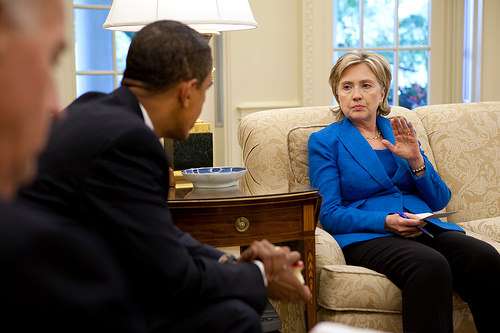Hillary Clinton and House Republicans Show Us That Future of Obamacare is Bipartisan Support for Making It Even Worse
The sudden convergence of political interests, at the expense of policy soundness, around Obamacare reveals how shaky the law's foundation remains.

Earlier this week, Hillary Clinton—who, despite struggling in some recent polls, is almost certain to be the Democratic party's presidential nominee next year—indicated that she wanted to get rid of one Obamacare's major provisions: the so-called "Cadillac tax," a 40 percent excise tax on high-cost, benefit-rich health insurance plans set to begin in 2018. Clinton's announcement is a reminder of how politically fragile the health care law remains, and how much uncertainty remains about whether the law will achieve its fiscal goals.
The inclusion of the Cadillac tax in Obamacare was a function of two competing imperatives—one policy, the other political.
From a policy perspective, economists have long decried the distortionary effect of the government's decision, around World War II, not to tax employee benefits like health insurance. The result was that the U.S. ended up with a health care system built largely on employer-sponsored insurance, and that employers over the years have tended to pile-on health insurance benefits, which, because they aren't taxed like wages, provide more bang for the buck than cash compensation. The tax exclusion for employer provided coverage has long been enemy number one for health policy wonks.
Politically, however, ending the employer tax exclusion has always been a tough sell, to put it mildly. Indeed, during the 2008 presidential campaign, Barack Obama attacked his Republican rival, John McCain, for proposing to tax employer health benefits. But when it came time to draw up the legislation that would become Obamacare, policy wonks wanted to do something to address the tax exclusion. The law's authors also needed a way to generate revenue to help ensure that the law would score as deficit neutral.
That's where the Cadillac tax comes in. It exists in the form it does in order to tackle the policy problem without technically going against what Obama said on the campaign trail. Because the excise applies to health plans rather than to individual policies, its design gave Obama a fig leaf that allowed him to say that he wasn't taxing anyone's benefits. But the tax on health plans resulted in essentially the same effect; so while it doesn't end the employer exclusion, it does restrain it, at the top end, by adding a significant cost to high-cost plans. The Cadillac tax also had the added benefit of scoring as a significant revenue raiser—one that went a long way toward helping Obamacare to be declared deficit neutral by the Congressional Budget Office.
In the years since Obamacare passed, projections for health care cost increases have flattened out, and expectations for how much money the Cadillac tax would raise have decreased. But it's still expected to bring in a non-trivial amount of money to help offset the health law's spending (about $6 billion a year). Repealing the Cadillac tax without replacing the revenue somehow would render the law less fiscally sound—and more likely to be a net increase in the deficit. Now, Clinton has said that she would replace the revenue, but she has not suggested any policy by which she might do so. At minimum, this tells us that there is no politically easy revenue replacement at the ready.
But even if she does replace the revenue somehow, repealing the Cadillac tax would undermine the provision's larger goal of dampening, even if only slowly and at the margins, the damaging effects of the carve-out for employer-sponsored benefits.
The Cadillac tax may not be the best way to do this, but it is almost certainly better than no way at all, and an alternative does not seem to be on the offer. This is why 101 economists of varying political loyalties recently signed a letter urging politicians to leave it in place, at least until an equivalent measure—not just a revenue replacement—can be put in place.
Clinton is, of course, not the only one seeking a repeal of the tax. In recent weeks, congressional Republicans have put forth proposals to do the same. In each case, the motivation is clearly driven by politics: Republicans are seeking to placate employers who don't like the provision, while Clinton is aiming to please unions, who have over the years negotiated for expensive benefits likely to be hit by the tax. (It is not a coincidence that news of Clinton's stance on the provision broke after her staffers let American Federation of Teachers President Randi Weingarten know of her decision.)
The sudden convergence of political interests, at the expense of policy soundness, around Obamacare reveals how shaky the law's foundation remains more than five years after passage, and how the politics around it may shift in unexpected ways as the law continues to settle into place. The future of Obamacare may turn out to be both parties working together to make it even worse.


Show Comments (53)